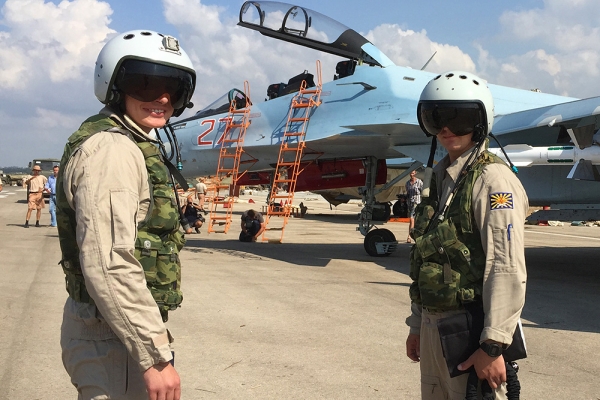
The United States suspended the dialogue with Russia on Syria, in Moscow there are accusations of war crimes. Battle for Aleppo could mark a turning point in the attitude of the West towards Russia.
Loud protest at the Russian Embassy; to make the cries of mothers from Aleppo were heard everywhere, where Vladimir Putin goes out of his plane; to require the government “to stop doing business with Russia as long as Moscow will not stop the bombers”. These are just some of the options for action that invites readers in its editorial, the influential magazine Der Spiegel in response to Russia’s actions in Syria, namely the bombing of Aleppo.
More and more German media sharply criticized Moscow’s actions in Syria. Louder than the others it still did the tabloid Bild, the biggest newspaper in Germany, who almost daily calls on Putin to stop the carnage in Aleppo. The left-liberal Süddeutsche Zeitung on Tuesday, October 4, in an editorial article predicts a bleak future and says that President Barack Obama naively hoped to bring Russia to resolve the Syrian crisis.
The end of “dialogue with the devil“?
The battle for Aleppo, which the Syrian army is supported by the Russian military, it seems, may become a turning point in relations between Russia and the West – in the direction of further exclusion. Concrete political step was announced on Monday, October 3, the U.S. decision to suspend the dialogue with Russia on settlement in Syria. Washington has accused Moscow of failure of peace agreements.
This turn has been in the summer, but clearly emerged two weeks ago after the attack on the humanitarian convoy near Aleppo. The leading countries of the West blamed Syria and Russia. The decision of the United States, among other things, was preceded by a heated discussion at the meeting of the UN security Council when the representative of Washington has accused Russia of “barbarism.”
Some Western countries such as the UK, talking about possible war crimes in Syria. It is noteworthy that such rhetoric is heard from the mouth of the head of the British foreign Ministry Boris Johnson, who a year ago, as mayor of London called for a “dialogue with the devil”, that is, to cooperate with the leaders of Russia and Syria.
The call to stop Nord stream-2
German Chancellor and leader of the conservative CDU/CSU Angela Merkel (Angela Merkel) also called the actions of the Russian and the Syrian army “barbaric”. Criticism, though less stringent, Minister of foreign Affairs Frank-Walter Steinmeier (Frank-Walter Steinmeier). “Who is committed to fight terrorists, not to attack the hospital,” said social Democrat.
The same party Steinmeier, Vice-Chancellor, Sigmar Gabriel (Sigmar Gabriel) has responded to Washington’s decision on termination of negotiations with Moscow on Syria with restraint, they say, is a manifestation of “our total helplessness” and “silence won’t help anyone”.
Hard political action Berlin towards Moscow was not followed and nothing indicates that they will appear soon. The representative of the “green” Robert Hubarg (Robert Habeck) remains a lone voice. Against the backdrop of events in Syria Hubarg called on Berlin to abandon the construction of the second phase of the Nord stream gas pipeline under the Baltic sea from Russia to Germany.
The politician, who with the rank of Minister in Schleswig-Holstein is responsible for the transition to renewable sources of energy, stated in late September in an interview with Spiegel Online. According to the Hubarg, after Russian bombings in Syria, the dependence of Germany and Europe from Russian gas “unbearable”.
An unexpected “gift“ to Ukraine
The change in attitude of the West towards Russia over Syria, if it did occur, may become an unexpected “gift” to Ukraine. Kiev anxiously waiting for the end of the year, when the European Union will decide whether to extend sanctions against Russia imposed over the Ukrainian crisis and linked to the Minsk agreements. Some Western politicians in recent years have increasingly talked about the need for easing of sanctions, observers predicted that this would happen.
But the events in Aleppo could turn the tide. Although the war in Syria and the implementation of the Minsk agreements are not directly connected, we can assume that Western leaders will not be easy to decide on the easing of sanctions on the background of the accusations against Russia of war crimes in Syria. The more that armed clashes in the Donbass continue.
Anti-Russian protests in Germany unlikely
As events in Syria can change the attitude of the Germans to Russia is difficult to predict. In the spring of sociologists have documented in the public opinion trend towards the abolition of sanctions against Russia. According to some polls, are in favor of it almost a third of Germans, according to others – more than half.
In any case, the protests in German cities against Russia’s policy in Syria as it was before the U.S. invasion of Iraq, seem unlikely. Many members of the anti-war movement in Germany in favor of dialogue with Russia, so it is hard for them to criticize the Kremlin. While on the streets in Germany leave most supporters of the policy of President Vladimir Putin, though their stock and few.
Perhaps the mood of the country will change by July 2017, when in Hamburg will host the G-20 summit and is expected in Germany for the first time after the annexation of Crimea and the cooling of relations with the West Putin arrives. Published in Hamburg Der Spiegel can at the Windows to see how the Germans will meet the master of the Kremlin.








